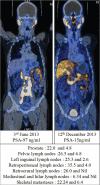Clinical Utility of Gallium-68 PSMA PET/CT Scan for Prostate Cancer
- PMID: 28533638
- PMCID: PMC5439210
- DOI: 10.4103/0972-3919.202255
Clinical Utility of Gallium-68 PSMA PET/CT Scan for Prostate Cancer
Abstract
Background: Prostate cancer is biologically and clinically a heterogeneous disease that makes imaging evaluation challenging. One of the important challenges in this cancer is to detect recurrent disease. Biochemical response using Prostate Specific Antigen (PSA) and Imaging using several PET tracers have poor sensitivity and specificity. Therefore, we analyse the role of Ga68-PSMA (Prostate Specific Membrane Antigen) imaging in prostate cancer, which is a new PET tracer.
Methods: In this study, we evaluated PET scans of 262 patients with diagnosis of prostate cancer. These patients were scanned using Ga68-PSMA for either staging or response evaluation.
Results: 336 PSMA scans were performed. Ga68-PSMA scan resulted in the detection of extra-prostatic disease in 53.2% of cases when done at baseline before commencing any treatment. The sensitivity of Ga68-PSMA at baseline with histopathological diagnosis was 95% with 95% CI ranging from 86% to 98%. The positive predictive value was high at 98% with 95% CI ranging from 91% to 99%. In 26 (10%) patients who had surgical castration, Ga68-PSMA scan was able to detect disease progression / castration resistance in 100% of cases. The outcome of castration-resistant prostate cancer was compared with other cases where castration was not done. In those who did not undergo castration, there was a significantly better response by hormone therapy (p = 0.03) and radiotherapy (p = 0.01) on Ga68-PSMA. The sensitivity of Ga68-PSMA response with biochemical response was 66.7% with 95% CI ranging between 46 %- 82.7%. Ga68-PSMA response did not correlate with biochemical response.
Conclusion: Ga68-PSMA has good sensitivity for diagnosis, staging, restaging, evaluation of therapy response and prognostication in prostate cancer.
Keywords: Ga68-PSMA; PET SCAN; diagnosis; molecular imaging; prostate cancer.
Conflict of interest statement
There are no conflicts of interest.
Figures





References
-
- Chappell B, McLoughlin J. Technical considerations when obtaining and interpreting prostatic biopsies from men with suspicion of early prostate cancer: Part I. BJU Int. 2005;95:1135–40. - PubMed
-
- Kato T, Tsukamoto E, Kuge Y, Takei T, Shiga T, Shinohara N, et al. Accumulation of [11 C] acetate in normal prostate and benign prostatic hyperplasia: comparison with prostate cancer. Eur J Nucl Med Mol Imaging. 2002;29:1492–5. - PubMed
-
- Cimitan M, Bortolus R, Morassut S, Canzonieri V, Garbeglio A, Baresic T, et al. [18F] fluorocholine PET/CT imaging for the detection of recurrent prostate cancer at PSA relapse: experience in 100 consecutive patients. Eur J Nucl Med Mol Imaging. 2006;33:1387–98. - PubMed
-
- Pelosi E, Arena V, Skanjeti A, Pirro V, Douroukas A, Pupi A, et al. Role of whole-body 18F-choline PET/CT in disease detection in patients with biochemical relapse after radical treatment for prostate cancer. Radiol Med. 2008;113:895–4. - PubMed
-
- Heinisch M, Dirisamer A, Loidl W, Stoiber F, Gruy B, Haim S, et al. Positron Emission Tomography/Computed Tomography with F-18-fluorocholine for Restaging of Prostate Cancer Patients: Meaningful at PSA < 5 ng/ml? Mol Imaging Biol. 2006;8:43–8. - PubMed
LinkOut - more resources
Full Text Sources
Other Literature Sources
Research Materials
Miscellaneous

